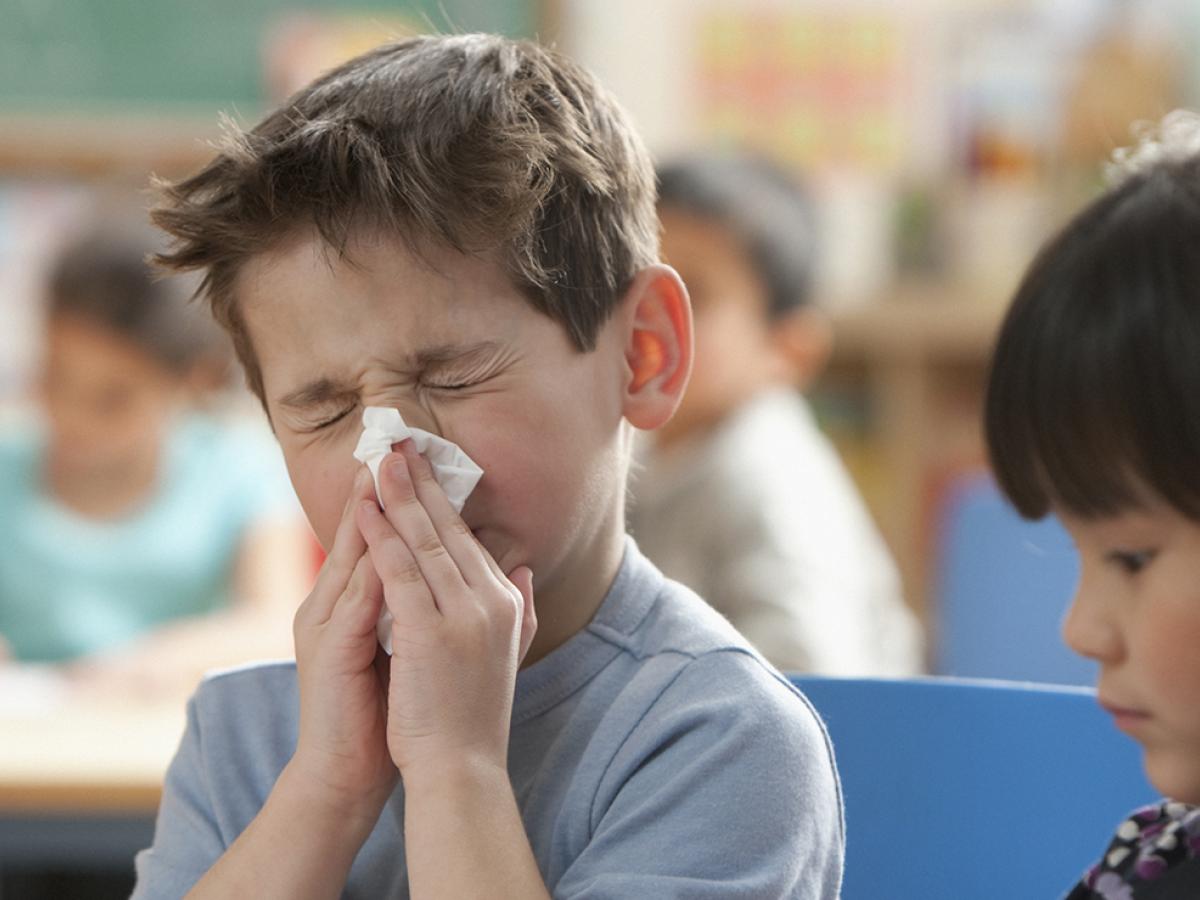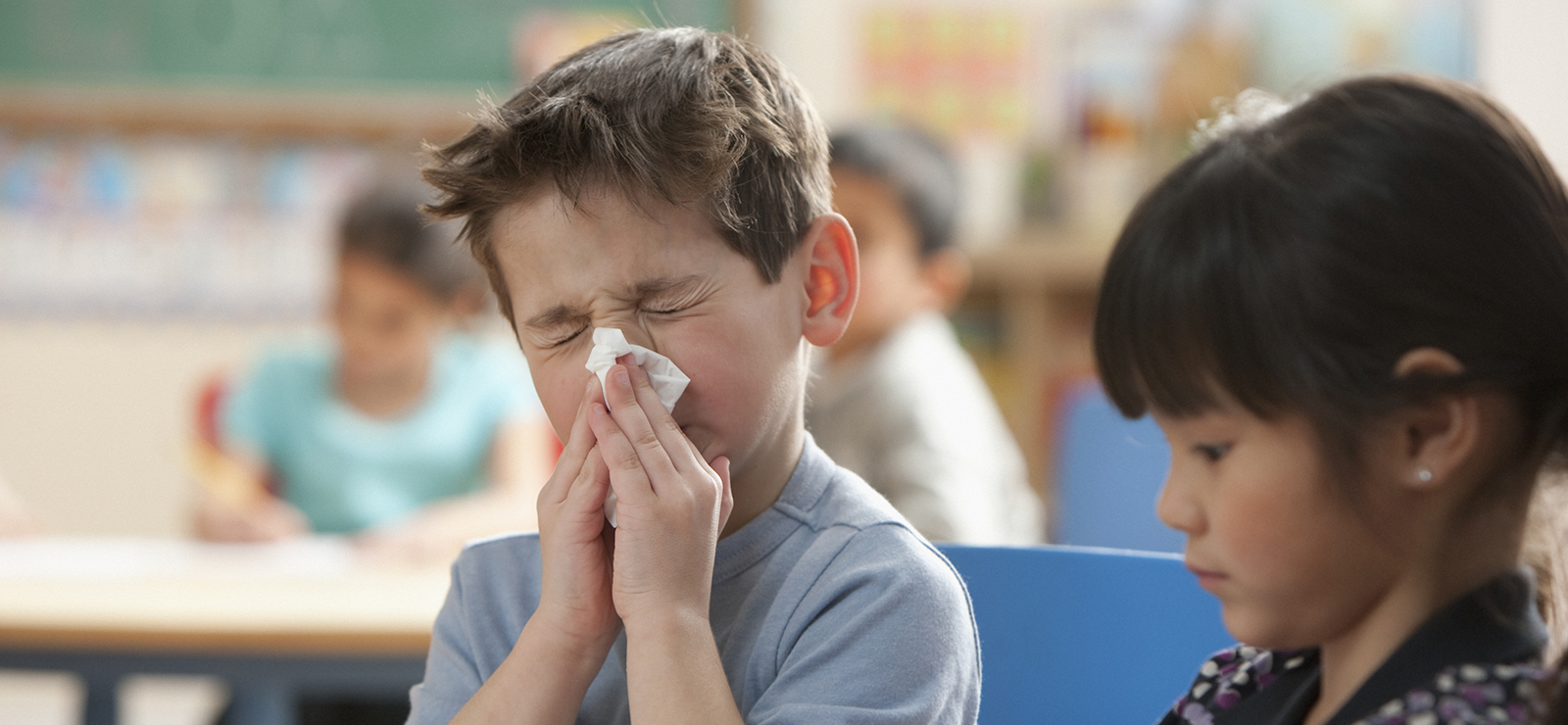September 24, 2023

No one wants to see their child with a fever or the sniffles. But let’s face it — kids get sick. A lot. Especially in the winter months.
The problem is that a child’s adaptive immune system is still developing. Unlike the innate immune system — the body’s first line of defense that includes skin, mucus and the cough reflex — the adaptive immune system needs time to build up. Its job is to fight off the germs that sneak by the innate immune system. But it requires exposure to those germs before it can “remember” them and form a targeted defense.
“You can’t build your immune system unless you use it,” says MU Health Care pediatrician Dr. Jessica Luebbering. “That’s why kids get sick more often during their first year at daycare or school when they’re exposed to a lot of new germs.”
The good news is that your kid doesn’t have to be seriously ill or sick all the time to strengthen their immunity. Two kids can be exposed to the same virus and experience different symptoms depending on how well their immune systems functions.
To help you keep your child as healthy as possible, Dr. Luebbering shares the best ways to boost your child’s immune system and reduce the time they spend sick:
3 Ways to Improve Your Child’s Immune System
Your child’s natural exposure to germs builds their immunity. But there are other ways to support your child’s immune system and keep it healthy and strong.
Dr. Luebbering recommends having your child:
1. Get vaccinated
Vaccines expose your child’s immune system to dangerous viruses without putting your kid in harm’s way. They contain only a fragment of the virus — just enough that the body can identify it, commit it to memory and mount a defense against it. The viral fragment is not strong enough to make your child sick.
“Vaccines teach the body how to build the antibodies needed to fight the virus,” Dr. Luebbering says. “Then, if their body gets exposed to that virus out in the wild — places like school, stores or the playground — the immune system already knows how to defeat it.”
The flu vaccine is critical, she adds. Each year, the flu vaccine is reformulated to target the expected strain of the flu. An annual flu shot offers the best protection against that year’s flu.
2. Eat healthy
Many people think supplements and vitamins are the best immune system booster. But Dr. Luebbering says there’s no need for supplements — especially for children — when you can eat the rainbow.
“Eating a wide variety of fruits, vegetables and other healthy foods can provide kids (and adults) with all the nutrients and natural antioxidants they need to boost their immunity and fight off infection,” she says. Antioxidants, such as vitamin C, protect the body’s cells.
Nutritious, whole food is a critical part of a healthy lifestyle. In fact, diet can be an extremely important part of your overall health, and having a healthy weight can reduce over inflammation in the body. These are things that Dr. Luebbering specializes in with her Tigers on Track program, a specialty program that helps children who are overweight or obese achieve healthier lifestyles.
“A healthy lifestyle is the best way to keep your immune system in good shape,” Dr. Luebbering says. “Focus on eating healthy, being physically active, drinking water and maintaining a healthy weight.”
3. Get enough sleep
Getting consistent and quality sleep at any age helps make the immune system stronger. Sleep strengthens the immune system’s ability to “remember” a virus or infection and makes vaccines more effective. Research also shows that not getting enough sleep — in the short or long term — can make you more likely to get sick.
“To be able to fight off infection and boost immunity, teenagers need to get at least eight to 10 hours of sleep a night,” Dr. Luebbering says. “Aim for nine to 13 hours each night if your kids are younger.”
Tips to Stay Healthy During Cold and Flu Season
Your child’s underdeveloped immune system can only do so much, especially when overwhelmed with germs during the fall and winter months. But you can reduce the load on your child’s immune system by encouraging your child to:
Prioritize handwashing
Little hands touch everything. But handwashing can remove more than 90% of the germs they pick up. Up your family’s handwashing game by:
- Digging deep: Show your kids how to wash between their fingers and under their nails — where pesky germs love to hide.
- Making it fun: Create a handwashing song or make it a challenge or contest to wash hands consistently.
- Washing longer: Use a timer to ensure handwashing lasts 30 seconds or more.
“Handwashing — when done well — can help prevent the spread of germs,” Dr. Luebbering says. “Have your kids wash their hands as soon as they enter the house.”
Avoid touching their face and eyes
The eyes, nose and mouth are the easiest ways for viruses to enter the body. “Kids put things in their mouths, touch everything they see and rub their eyes,” Dr. Luebbering says. “That’s how those germs will get in.”
Show your children how to sneeze and cough into their elbows, not their hands. But just to be safe, see the previous tip on handwashing.
Quit the pacifier
Pacifiers can keep babies happy, make them feel secure and provide you with some peace. But if that pacifier gets your child sick, the peace you relish will be long gone.
“Pacifiers are a huge spreader of germs,” says Dr. Luebbering. The pores in the plastic can be a breeding ground for bacteria and fungi. Viruses also tend to live longer on plastic. “If you’re waiting for the right time and a good reason to break the pacifier habit, this is it.”
Spend time outdoors
There’s a reason cold and flu season corresponds to the months we spend most time indoors — viruses spread more easily in dry, indoor air.
“People wonder why it’s so easy to pick up viruses in the winter,” Dr. Luebbering says. “It’s simply because people hunker down in close quarters.”
Whenever the weather allows, let your children play outside. The fresh air reduces the risk of picking up a virus since kids won’t be rebreathing in the same circulating germs. As a bonus, time spent in sunshine will boost vitamin D levels, which helps the immune system fight off infection.
Next Steps and Useful Resources
Want to discuss more with a pediatrician? Find one today.


